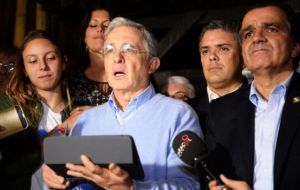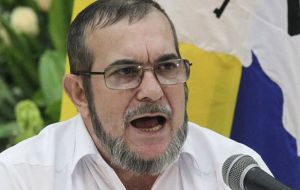MercoPress. South Atlantic News Agency
Colombia the day after: Uribe holds the key to a peace deal, but much harsher on FARC commanders
 Santos told Colombians that a month-old bilateral cease-fire with FARC would remain in effect. He ordered his negotiating team to return to Cuba
Santos told Colombians that a month-old bilateral cease-fire with FARC would remain in effect. He ordered his negotiating team to return to Cuba  Former president and senator Álvaro Uribe, who led the campaign against the accord, did not even attend the emergency meeting, nor did the leaders of his party.
Former president and senator Álvaro Uribe, who led the campaign against the accord, did not even attend the emergency meeting, nor did the leaders of his party.  The path was further muddled by FARC commander Timochenko - claiming that the peace accord is legally binding because it was signed by Santos.
The path was further muddled by FARC commander Timochenko - claiming that the peace accord is legally binding because it was signed by Santos. Colombia's president tried Monday to keep alive an agreement to end Latin America's longest-running war after a shocking rejection by voters, but his opponents made clear their price for joining the effort will be steep.
President Juan Manuel Santos invited Colombia's political parties to an emergency meeting Monday and asked them to form a big-tent coalition to rework the deal and make it more appealing to the voters who spurned it in Sunday's referendum by a narrow margin.
Santos told Colombians that a month-old bilateral cease-fire with the Revolutionary Armed Forces of Colombia (FARC) would remain in effect. He ordered his negotiating team to return to Cuba, where the peace talks were held, to resume contacts with FARC leaders.
But despite Santos's rescue attempts, the peace process was thrown into the lurch. Former president and senator Álvaro Uribe, who led the campaign against the accord, did not even attend the emergency meeting, nor did the leaders of his party.
The path forward was further muddled by a statement Monday from FARC commander Rodrigo Londoño - known as Timochenko - claiming that the peace accord is legally binding because it was signed by Santos. But that was not the Santos government's interpretation when it insisted on a voter referendum.
With the deal at risk of collapse, a half-century war that has killed more than 220,000 and displaced eight million, could easily flare up again, a scenario that seemed unimaginable before Sunday.
The possibility of peace in Colombia - a key U.S. ally in South America, and the continent's third-largest economy - now comes down to two critical questions. How much are the guerrillas willing to give up for an rewritten accord? And how badly do Colombia's polarized political parties want to work together to end the war?
It may be impossible to produce a viable 2.0 version of the agreement unless the Santos government can get Uribe and his supporters behind it. Uribe's party issued a statement saying it remained willing to discuss the formation of a “national pact.” But Uribe, the son of a cattle rancher who was killed by the FARC, is the guerrillas' longtime archenemy.
He may offer a form of amnesty to the rank-and-file troops of FARC's nearly 5,800 fighters, but he will almost certainly insist on a peace deal with far tougher terms for FARC commanders, who have maintained they are not willing to go to prison.
Rebel leader Timochenko said Monday that the FARC remains committed to ending the war. But he now faces a major test of leadership.
He and other commanders could reject Uribe's terms, and they would have few logistical obstacles to ramping up the war again. The majority of their guerrilla units remain in their jungle hideouts. They have their weapons and their traditional sources of revenue, with Colombia's illegal coca output booming.
But a return to combat may be a huge psychological challenge for ordinary rebel fighters, who have been preparing for the transition to civilian life and reuniting with their families. Many are exhausted or maimed by the war, and while the FARC's commanders are safe and comfortable in Cuba, ordinary fighters may be less willing to grind out a new battle of attrition.
On the government side, the question is how much Uribe is willing to help fashion a new offer to the rebels. The opposition leader may be in no mood to offer Santos a political bailout, especially since their parties begin to maneuver ahead of Colombia's 2018 presidential election.
Adam Isacson, a Colombia analyst at the Washington Office on Latin America, said the “best case scenario” for the peace accord would be for the rivals to reach a consensus on a path forward with a new timetable for negotiations.
“In the worst case, the parties can't agree, and without that clarity, the existing cease-fire is unlikely to hold,” said Isacson, who was in Bogota.
Uribe wants to scrap the “transitional justice” element of the deal that would have allowed FARC leaders to avoid prison if they fully confessed their crimes and made reparations to victims. He has likened this to “total impunity” for rebel commanders whose tactics included bombings, kidnappings, murders, drug trafficking and the forced recruitment of minors.
Uribe has also opposed provisions in the accord that would have granted the FARC 10 seats in Colombia's Congress through 2026, and he signaled that the agreement's commitments on new investments in rural development - the thing the rebels were most proud of - are unaffordable.
Sunday's results were a gut-punch to the Santos government and the peace deal's supporters. The government's agreement with the FARC had taken nearly six years to negotiate and won winning the support of the United States, the United Nations and Pope Francis. Ringo Starr even recorded a song for it.




Top Comments
Disclaimer & comment rules-

-

-

Read all commentsA really sad story that clearly shows who's really interested in keeping the violence going: Members of the wealthy landowner class, who are ready to continue bloodshed against any possibility of democracy taking hold in Colombia.
Oct 04th, 2016 - 03:41 pm 0@1 EM
Oct 04th, 2016 - 03:50 pm 0And the people voted against it why?
What I don't understand is the low turnout. It's not like it's some irrelevant issue...
@1 It's true that some of the very wealthy don't want the accord. However, to say that they're the ones preventing the yes vote from happening is beyond ridiculous.
Oct 04th, 2016 - 05:24 pm 0Commenting for this story is now closed.
If you have a Facebook account, become a fan and comment on our Facebook Page!